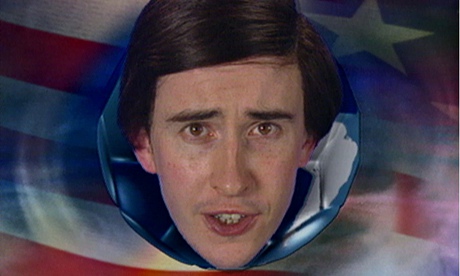
These days I can barely bring myself to watch the news, a seemingly endless parade of war, famine, pestilence and party conferences. Just occasionally, however, it proves worth it. How else would I have heard the classically plummy tones of the BBC’s legal correspondent solemnly proclaim: “I have come to a secret location in south London to meet Cassetteboy. He’s a kind of Banksy-style guerilla-video-online-parodist-mash-up expert and he’s agreed to talk to me on the strict condition that, in order to protect his identity, throughout our interview he wears a large cardboard cassette tape over his face.”
It was a perfect media moment, a clashing juxtaposition of the BBC’s earnest paternalism with the irreverent impertinence of the artist which, despite strong overtones of Chris Morris and The Day Today, served to convey beautifully the news item in question: the relaxation of copyright law to allow an exception for parody and satire.
It was sporting of the BBC News team to go along with Cassetteboy’s demands, considering that its broadcasts have previously been on the receiving end of his skills with digital cut and paste. Watching the news can never be the same again after you have heard George Alagiah announce: “A reminder of tonight’s main salacious gossip.”
This is a good day for satirists and their audiences, albeit one that still falls short of the ideal. If challenged, an artist would have to stand up in court and attempt to prove that the appropriation of copyrighted material was justified because the end result was satirical or funny. That may be easier said than done. For instance, I am convinced that the single funniest thing on the internet is Dave Bowman from 2001: A Space Odyssey arguing with Papa Lazarou, courtesy of audiovisual artists Hexstatic, but I am not sure I could stand up and explain why to a high court judge.
If cut-and-paste comedy is obviously protected by the new rules, musical creations remain in a more murky musical limbo. I don’t think many would dispute that Swede Mason’s Masterchef Synaesthesia hurdles the bar of parody and satire, but can musicians parody other musicians? I happen to think the dubstep Fresh Prince is hilarious, but suspect Will Smith’s lawyers may choose to disagree.
In practice, the music industry has still to fully come to grips with sampling and unauthorised usage. The internet is afloat with unauthorised remixes and recordings, and new releases are peppered with samples of samples of samples. Major labels go through the motions of clearing and occasionally even paying for use of samples, but have long ago given up on pursuing payment for every riff or drum loop. Since the majority of musical creations never make a penny of profit, this is the only reasonable approach. It tends to be only when a release proves an unexpected hit that the lawyers get interested, as discovered by New York DJ Baauer when his obscure white label release Harlem Shake became 2013’s most unpredictable hit.
The law remains a hopelessly blunt implement, often inept at ensuring creative artists earn fair returns for their compositions or performances, while hovering harmfully above new generations of digital innovators. These are people for whom the global canon of recorded materials stands not as a sacred monument to be preserved behind glass for all eternity, but a vast toolbox or toybox to be played with in ever new and creative ways.
It is likely that future generations will be astonished we ever thought we could control the use of sounds, images and videos once they have been released into the wild. Right now in a bedroom somewhere, the BBC’s interview with Cassetteboy is doubtless being re-cut, Auto-Tuned and put to a dubstep beat. This article is being reprinted and quoted, with or without legal authority, on hundreds of aggregator and syndication sites around the world (fly my pretties, fly.) And it pleases me immensely that when future historians look back on the liberation of copyright, a small but important footnote in the story will involve the BBC interviewing a man wearing a large cardboard cassette on his head.

